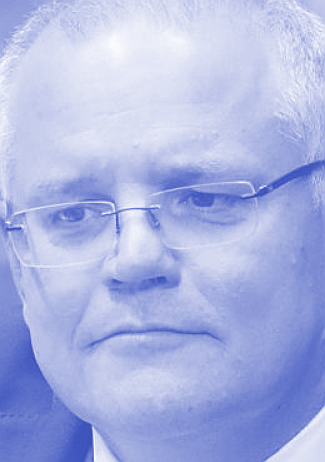Ex-PM grilled over debt scheme
 Former prime minister Scott Morrison has fronted the Robodebt royal commission.
Former prime minister Scott Morrison has fronted the Robodebt royal commission.
The ongoing commission is looking into the ‘Robodebt’ scheme introduced by Morrison, which involved using individuals’ annual tax information provided by the ATO to determine average fortnightly earnings and automatically establish welfare debts.
The approach was ruled unlawful by the Federal Court in 2019, leading to a large compensation payout.
Hearings this week have focused on legal advice given to public servants and ministers. It has been alleged that the department and relevant ministers knew that legislative change would be required to run the scheme, as it would not have been lawful in the form it was presented.
However, in some briefing notes, the suggestion for legislative change appears to have disappeared.
Mr Morrison was questioned over why the changes to welfare debt protocols were adopted, despite concerns about their legality, when he was social services minister in 2015.
Mr Morrison signed a departmental document that stated legislative change could be necessary, but that note was absent when the policy was later presented to cabinet for consideration.
He claimed that he was never advised that the Robodebt scheme was unlawful before he signed off on it.
Counsel assisting the commission Justin Greggery, KC, accused Mr Morrison of not asking about the legality of the scheme when he had the opportunity. The former PM said that if he had been given the information “in the way that I’ve now seen it ... then I doubt we’d be sitting here today”.
“The critical failure in the system ... was that this advice, which had been sought prior to my turning up [as minister in late 2014] was not brought to the attention of ministers, and I believe there was an obligation and duty to do so,” Mr Morrison said.
He added that it was “distressing” that he did not know why that had not occurred.
He was asked directly by commissioner Catherine Holmes why departmental briefs that he signed in February 2015 that mentioned legislative change were different to the submission that went to cabinet, which lacked the legal information.
Mr Morrison said this was because he believed at the time the legal issues had been resolved and the final proposal indicated “they did discuss it, they did work it through, and they did come to a view in their formal advice, that legislation was not required”.
Commissioner Holmes asked why Mr Morrison did not ask his department for an explanation, to which the ex-PM replied: “Because I didn’t see it as necessary, because they had affirmed that so strongly, and I had great faith in the department to work through the matters that they were working through”.
He claimed that “the suggestion to me that internal department legal advice was not conveyed to ministers was unthinkable”, leading Mr Greggery to note; “And yet it happened”, to which Mr Morrison said: “Yes.”
After giving a series of long and convoluted responses to questions, Commissioner Holmes grew impatient.
“Can I just get you to stick to answering the question a bit more?” Ms Holmes ordered the former prime minister.
“I do understand that you come from a background where rhetoric is important but it is necessary to listen to the question and just answer it without extra detail; unnecessary detail.”
Mr Morrison was warned several times that he was bogging down the commission with semantics, including giving answers that were “really not that relevant”.
He also tried to insist that the use of “income averaging” was not new, as ATO data had been matched against welfare beneficiary’s income since 1989.
Commissioner Holmes shut down that claim, noting “income matching is not income averaging”.
The commissioners suggested that Mr Morrison’s motives with the scheme - to create a “welfare cop” to crack down on fraud, the potential of over $1 billion in budget savings, a hostile Senate and a tight timeframe - had combined to create an environment in which departmental staff lacked the courage to warn him of the legal issues.
NDIS and Government Services Minister Bill Shorten said Mr Morrison continues to fail to take responsibility for the fraught scheme.
“It shows no self-insight. It is a defensive lecture about why everyone else is wrong and he’s right,” Mr Shorten said of Mr Morrison’s evidence.








 Print
Print